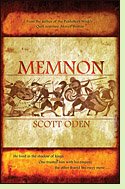Memnon
by Scott Oden
Reviewed by David Maclaine

Scott Oden's Memnon offers a fresh perspective on the world in which Alexander of Macedon was born, came of age and set out to conquer. The title character is a young man of Rhodes whose need to distinguish himself from an imposing father is complicated by the sudden onset of civil war. Memnon joins his older brother, a mercenary general named Mentor, and soon finds a surrogate father in their patron and father-in-law the Persian satrap Artabazus, who is in rebellion against the Persian emperor Ochus. Memnon grows into an accomplished leader of men during the trials of a failed rebellion and exile in Macedonia. Then his patron's return to the Persian king's favor after Mentor's conquest of Egypt makes Memnon effective ruler of the western half of the empire. But a challenge looms across the straits, where Philip of Macedon is preparing to invade. Soon Memnon finds himself at the point of collision between the great powers of East and West.
The title character never fully captured my sympathy. Memnon's varied desires for revenge, loyalty, love and honor never quite coalesced into a man I could understand. The energy Oden spends on describing the landscape and on classical allusions might have been better spent adding another dimension to his hero's inner life and clashing values. But if I could not completely sympathize with Memnon's choice of loyalty, his story still helped me gain a deeper understanding of the problems faced by the Greeks and Persians in the borderlands where their cultures overlapped. Oden can't quite raise his hero from the shadow of Alexander, but Memnon does at least remind us that there were Greeks of good will and decent values who had good reason to see the Macedonian invasion as an evil they were duty-bound to resist. (2006, 503 pages)
More about Memnon at Powell's Books, Amazon.comMemnon appears on the list of The 36 Best Historical Novels for a Survey of Ancient Greek History
Other novels about wars with Persia:
Killer of Men by Christian Cameron (2010), about a Greek farmer's son trained in warfare just as the Greco-Persian wars are about to begin. See review or more info at Amazon.com
The Ten Thousand by Michael Curtis Ford (2001), about the Athenian soldier Xenophon and an army of ten thousand Greek mercenaries who fight in a war to topple the Persian ruler. See review or more info at Powell's Books
A Victor of Salamis by William Stearns Davis (1907), about the Greeks defending their homeland from the Persians. See review or more info at Powell's Books
Nonfiction about the Battle of the Granicus, in which Memnon and Alexander fought on opposite sides:
Alexander at the Battle of the Granicus: A Campaign in Context by Rupert Matthews (2008). More info
Granicus: 334 B.C. by Michael Thompson (2007). More info
Battle of the Granicus by Jesse Russell and Ronald Cohn (2012), a Wikipedia article in print format. More info
Online:
Wars of Alexander the Great: Battle of the Granicus, an article by John R. Mixter at HistoryNet.com
Back to Novels of Ancient History
Back to Directory of Book Reviews